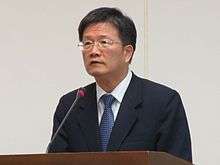Wu Tang-chieh
Wu Tang-chieh (Chinese: 吳當傑; pinyin: Wú Dāngjié) is a Taiwanese politician. He was the Political Deputy Minister of Finance in the Executive Yuan from 2 September 2013 until 20 May 2016.[1][2]
Wu Tang-chieh | |
|---|---|
吳當傑 | |
 | |
| Political Deputy Minister of Finance of the Republic of China | |
| In office 2 September 2013 – 20 May 2016 | |
| Minister | Chang Sheng-ford |
| Preceded by | Tseng Ming-chung |
| Vice Chairperson of the Financial Supervisory Commission of the Executive Yuan | |
| Chairperson | Chen Yuh-chang |
| Succeeded by | Huang Tien-mu |
| Personal details | |
| Nationality | Republic of China |
| Alma mater | National Chung Hsing University National Chengchi University University of Wisconsin |
Education
Wu holds a bachelor's degree in finance and taxation from National Chung Hsing University, master's degree in finance from National Chengchi University and doctoral degree in law from University of Wisconsin in the United States.[3]
Financial Supervisory Commission vice chairperson
More fair and friendly Taiwan stock trading
In December 2012, Wu said that the ROC government aims to take measures in the coming year to make stock trading in Taiwan more fair and friendly. He elaborated that there are four plans to achieve the goal, which are increasing market momentum, diversifying quality financial products, cutting the trading costs and increasing international visibility.
With regards to the implementation of stock gains tax which was set to be effective starting on 1 January 2013, Wu said that the tax will not have a major impact on Taiwan's stock market.[4]
References
- "Political Deputy Minister, Ministry of Finance". mof.gov.tw. Retrieved 2014-08-22.
- "Wu Tang-chieh named Taiwan's vice minister of finance - Asia Asset Management - The Journal of Investments & Pensions". Asiaasset.com. 2013-09-04. Retrieved 2014-04-28.
- "Executive Yuan appoints new deputies for four agencies (Executive Yuan, R.O.C. (Taiwan)-Press Releases)". ey.gov.tw. Retrieved 2014-08-22.
- "Radio Taiwan International". Archived from the original on 2013-10-29. Retrieved 2014-08-22.